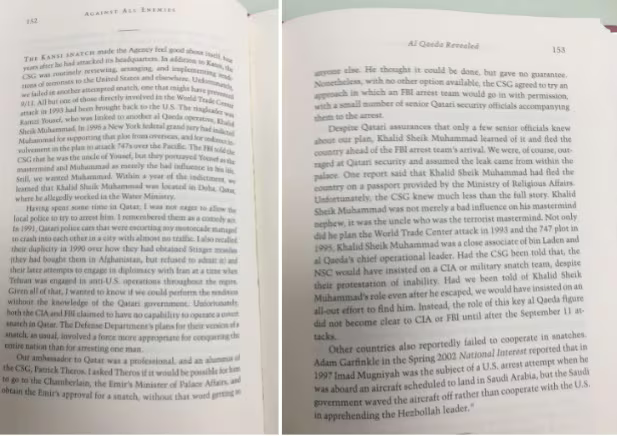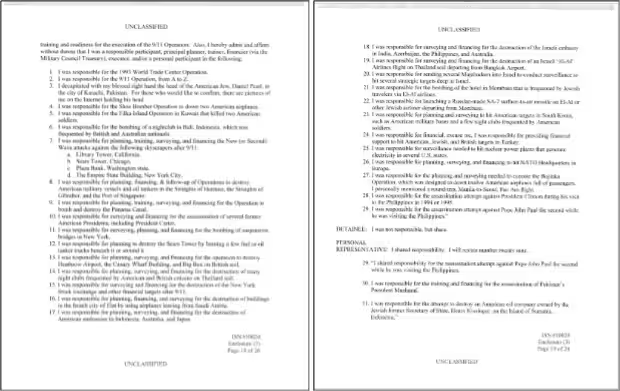Introduction
The U.S.’s plea bargain with alleged 9/11 mastermind Khaled Sheikh Mohammad (KSM) would have prevented the full exposure of Qatar’s role and responsibility in the attack.
The plea bargain, which has now been rescinded by U.S. Secretary of Defense Lloyd Austin, brought to light new and old documents about KSM’s role in terrorist attacks against the U.S. and other countries when he was an employee of the state of Qatar and enjoyed the safe haven that it granted him. The documents also reveal that Qatar facilitated KSM’s activities and his escape from arrest by the FBI.
When the FBI came to Doha in 1996 to arrest KSM (see his confession below), the only ones reportedly to be informed of this, in confidentiality, was the Qatari emir and the palace. Within hours, KSM had disappeared (see page 91 of the 9/11 Commission Report, on KSM’s escape from Qatar).
KSM’s escape from Qatar was also revealed by Richard A. Clarke, counterterrorism advisor to Presidents Bill Clinton and George H. W. Bush, in his 2004 book Against All Enemies: Inside America’s War on Terror, pages 152-153:

In the book, Clarke wrote that a report had stated that KSM learned about the U.S. plan to capture him: “We were, of course, outraged at Qatari security and assumed the leak came from within the palace.” One report, Clarke said, contended that KSM had “fled the country on a passport provided by the [Qatari] Ministry of Religious Affairs.” That government ministry was headed by Abdullah bin Khalid Aal-Thani, a member of the Qatari ruling family.
Qatar’s role in enabling KSM to escape arrest by the FBI (only to continue on to terrorist attacks like 9/11) constitutes a major political and criminal indictment of the government of Qatar.
This document will quote extensively from three documents: a) KSM’s confession from 2007; b) the 9/11 Commission Report, which includes information about KSM’s whereabouts and terrorist activities; and c) the Department of Defense memorandum about KSM’s life and terrorist activities during his employment by the state of Qatar and his time living there and using it as a base for his travels, “much of it in furtherance of terrorist activities.” There are also additional reports and documents about KSM’s activities in Qatar.
Despite the existence of KSM’s confession, and despite the information in all the above-mentioned documents about Qatar’s role and complicity in his terrorist activities, no punitive measures against Qatar have been taken by consecutive U.S. administrations. This raises questions.
Qatar is the world’s leading state sponsor of Islamic terrorist organizations and movements. It continues to support a wide range of Sunni and Shi’ite terrorist movements – the Islamic State (ISIS), Al-Qaeda, Hamas, Hizbullah, the Houthis, the Taliban, Jabhat Al-Nusra, Hayat Tahrir Al-Sham, and Iran’s Islamic Revolutionary Guard Corps (IRGC).
This document will review two types of Qatari sponsorship of Islamist terrorism: a) supporting Islamist organizations and movements and b) the specific role of Qatar in sponsoring KSM, the Al-Qaeda mastermind, and his specific responsibility for both World Trade Center attacks as well as other attacks, in planning and execution. While 15 out of the 19 perpetrators of the 9/11 attacks were Saudi individuals, Qatar’s involvement was on the state level.
Part A: Qatar’s Record Of Supporting Islamist Terrorist Organizations, Movements And States
The murder of U.S. Ambassador to Libya John Christopher Stevens in September 2012 in Benghazi was perpetrated by the Qatar-supported Al-Qaeda affiliate Ansar Al-Sharia.[1]
With regard to Hayat Tahrir Al-Sham and the Al-Nusra Front, individuals linked to both are on trial in Europe and the U.S. on charges of belonging to these Qatar-supported terror organizations.[2]
In Afghanistan, Qatar nurtured the Taliban for years, culminating in the Taliban’s violent takeover of the regime from the democratically elected secular president Ashraf Ghani in August 2021, with 13 U.S. troop fatalities.[3]
Qatar even supports the Islamist movement in northern Mali.[4] According to a leaked Qatari document,[5] in 2011 the Emir of Qatar instructed that $15 million be paid to Islamist movements in northern Mali and in the Sahel.
In Tunisia, Qatar supports the Muslim Brotherhood Al-Nahda party leader Rashed Al Ghannouchi against secular authoritarian president Kais Saied.[6]
In Sudan, Qatar is supporting the Muslim Brotherhood General Abdel Fattah Al-Burhan against the secular Gen. Mohamed Hamdan Dagalo (nicknamed “Hemedti”).[7]
In 2020, German[8] and American[9] media reported that Qatar had allegedly funded Hizbullah, which is designated as terrorist by the U.S.
Following the U.S. and U.K. bombings of the Houthis in Yemen aimed at ensuring free passage for shipping in the Red Sea, Qatar recently moved to defend the Houthis from these bombings by pausing shipments of LNG through the Red Sea to Europe.[10] This will inevitably lead to a rise in the price of oil in the West and will pressure the U.S. and U.K to stop the bombing.
Over the last 10 years, the supremely opulent Qatar government funneled billions of dollars to the U.S.- and E.U.- EU-sanctioned terrorist movement Hamas. Counterterrorism experts have pushed in the U.S. Congress for the past decade for Qatar to be added to U.S. State Department’s list of state sponsors of terrorism.[11]
In February 2024, MEMRI published a report stating that between 2021 and 2023 Qatar trained Hamas security officials.[12]
In 2021, U.S. media outlets reported that Qatar had funded Iran’s Islamic Revolutionary Guard Corps.[13]
Qatar’s support of Al-Qaeda will be detailed in Part B below.
Part B: Qatar, Al-Qaeda, And KSM: The Troika Of Islamist Terrorism Worldwide
Information about KSM’s terrorist activities has been gradually released since the 1990s by the U.S. government. KSM’s confession in Guantanamo appeared in U.S. media in 2007, when victims could still sue Qatar for compensation. Lately, more information has been revealed, following the U.S. government’s decision (now rescinded) to cut a plea deal with him.
While KSM admitted to all of these crimes after highly controversial CIA “enhanced interrogation” techniques after being apprehended in 2003, he was already wanted (by the FBI and other agencies) long before then for multiple terrorist attacks. These included the 1993 World Trade Center bombing (for which he was indicted; following that, in early 1996, he fled to Pakistan to avoid capture by U.S. authorities). It also included the 1994 and 1995 airplane plots in the Philippines that were considered a dry run for 9/11, and other crimes. In addition, there is further evidence of his involvement in other actions – such as 9/11 and the gruesome 2002 murder of journalist Daniel Pearl – independent of any confession derived from CIA interrogation. According to KSM’s confession as published by the Pentagon, he is supposedly responsible for the following terrorist attacks that he planned, masterminded, or executed.

The following is a summary of KSM’s activities, based on the 9/11 Commission Report:
Khalid Sheikh Mohammed (KSM) was actively involved in terrorist activities and planning while residing in Qatar during the mid-1990s. According to the 9/11 Commission Report, he moved to Qatar at the request of a patron in the Qatari government, Abdul Rahman Yasin. In Qatar, KSM worked for the Ministry of Electricity and Water. Despite his government employment, he continued to engage in activities related to terrorist networks, leveraging his position to facilitate his operations.
In 1996, KSM began planning for what would eventually become the 9/11 attacks. While in Qatar, he experimented with flight simulator software, indicating his early interest in using aircraft as weapons. His presence in Qatar provided him a safe haven where he could plan and coordinate without significant interference.
However, KSM’s stay in Qatar came to an end when U.S. authorities began to close in on him following their investigation into his involvement in earlier terrorist plots, including the 1993 World Trade Center bombing. Fearing arrest, KSM fled Qatar in 1996, moving first to Afghanistan and then to Pakistan, where he continued to develop the plans that ultimately culminated in the 9/11 attacks.
This summary underscores KSM’s use of Qatar as a base for logistical planning and coordination of terrorist activities during the crucial early stages of the plot that led to the 9/11 attacks.
The 9/11 Commission Report details KSM’s connections in Qatar, which were significant for his operations during the mid-1990s. KSM developed relationships with influential individuals within Qatar, which facilitated his stay and activities there. Notably, he received protection and employment from a Qatari government official, allowing him to live openly in Doha and work at the Ministry of Electricity and Water.
KSM’s connections in Qatar were crucial for his operational security. These relationships provided him with a degree of protection that made it difficult for U.S. authorities to apprehend him during their investigations into his terrorist activities. His patron in Qatar, whose identity and exact motivations remain a matter of sensitivity, appears to have played a key role in providing KSM the necessary cover to plan and coordinate terrorist activities, including early planning stages of what would become the 9/11 attacks.
However, when U.S. pressure to capture KSM intensified, his protective network in Qatar became less secure. Facing the risk of capture due to increasing international scrutiny, KSM left Qatar in 1996, moving first to Afghanistan. This departure marked the end of his direct connections with Qatar, as he then operated from different bases, primarily in Afghanistan under the protection of the Taliban and later in Pakistan.
These connections in Qatar illustrate a critical phase in KSM’s life, showing how relationships within state structures can be exploited by individuals involved in international terrorism. This period in Qatar was essential for KSM’s transition into one of the principal architects of the 9/11.
The Department of Defense also published a memorandum, of 15 pages, detailing KSM’s activities and whereabouts.
Former FBI officer Frank Pellegrino and journalist Josh Meyer also confirmed Qatar’s role in aiding KSM (and also in a memorandum).
APPENDIX I
The Qatar-owned Al-Jazeera network serves to promote Islamic terrorism worldwide.
APPENDIX II
Qatar is the Trojan Horse in Washington, D.C. Qatar stands for Hamas and it is part of another bloc – the anti-U.S. bloc comprising Hamas, Hizbullah, the Houthis, Iran, Russia, and China (even on the issue of Taiwan, Qatar sides with China).How can Qatar be regarded as a non-NATO U.S. ally with its record of supporting terrorist Islamic organizations and movements.
[1] MEMRI Daily Brief No. 653, Why Do The U.S. And Israel Tolerate Qatar’s Blatant Anti-U.S. And Anti-Israel Policies?, January 16, 2024. [2] Ibid. [3] MEMRI Daily Brief No. 577, Will There Be A U.S.-Qatar Strategic Dialogue? March 4, 2024. [4] France24.com/en/20130121-qatar-mali-france-ansar-dine-mnla-al-qaeda-sunni-islam-doha, January 21, 2013. [5] MEMRI Special Dispatch No. 10986, The Raven Project Leaks: Qatar Reportedly Paid $15 Million To Islamist Movements In Northern Mali And The Sahel In 2011, November 29, 2023. [6] MEMRI TV Clip No. 10130, Rached Ghannouchi, Leader Of Tunisia’s Muslim Brotherhood-Linked Ennahda Movement, Congratulates Iran On 44th Anniversary Of The Islamic Revolution: It Played A Major Role In The Global Islamic Revival, February 11, 2023. [7] MEMRI Daily Brief No. 522, The Beginning Of The Endgame In Sudan?, September 14, 2023 [8] Zeit.de/politik/2020-07/katar-finanzierung-hisbollah-vorwuerfe, July 17, 2020. [9] Foxnews.com/world/qatars-finance-of-hezbollah-terrorist-movement-puts-us-troops-at-risk-dossier-claims, August 5, 2020. [10] MEMRI Daily Brief No. 653, Why Do The U.S. And Israel Tolerate Qatar’s Blatant Anti-U.S. And Anti-Israel Policies?, January 16, 2024. [11] Docs.house.gov/meetings/BA/BA10/20231025/116509/HHRG-118-BA10-Wstate-GoldbergR-20231025.pdf, October 25, 2023. [12] MEMRI Special Dispatch No. 11111, Officers Of Hamas Security Apparatuses Trained In Qatar, February 1, 2024. [13] Washingtonexaminer.com/news/1812900/us-investigates-qatar-over-claims-that-it-finances-irans-revolutionary-guards-corps/, July 23, 2021. Eurasia Press & News
Eurasia Press & News


